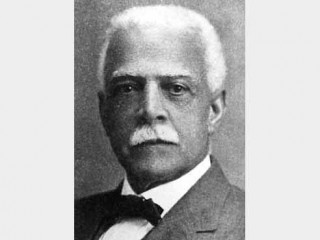
Archibald Grimké biography
Date of birth : 1849-08-17
Date of death : 1930-02-25
Birthplace : Charleston, South Carolina, U.S.
Nationality : American
Category : Famous Figures
Last modified : 2010-07-16
Credited as : Lawyer and diplomat, author, civil rights activist
0 votes so far
Archibald Grimké was born on Aug. 17, 1849, near Charleston, S.C., of Nancy Weston, a slave by birth, and Henry Grimké, a prosperous white planter with liberal tendencies. Grimké entered Lincoln University, Pa., earning his bachelor of arts degree (1870) and master of arts degree (1872). Aided by his white aunts, Sarah and Angelina Grimké, and Angelina's husband, Theodore Weld, he completed Harvard Law School (1874). Grimké entered law practice in Boston with an established firm and met many former abolitionists and reformers. In 1879 he married Sarah E. Stanley and began his career as a civil rights spokesman and author.
From 1883 to 1885 Grimké edited the Hub, a Boston newspaper devoted to the welfare of African Americans. At the invitation of a leading publishing firm he wrote biographies of two antislavery leaders: William Lloyd Garrison, the Abolitionist (1891) and The Life of Charles Sumner, the Scholar in Politics (1892). Meanwhile, he was a special columnist for several newspapers and contributed to the Atlantic Monthly.
From 1894 to 1898 Grimké served as U.S. consul to Santo Domingo. Returning to the United States, he lived in Washington, D.C., where he continued to champion civil rights and combat prejudice. In 1899, representing the Colored National League, he wrote an open letter to President William McKinley on behalf of black voters. He became a member of the American Negro Academy almost from its inception in 1897, serving as president from 1903 to 1916.
Throughout this period Grimké published articles and pamphlets concerning black life and history. These included "Right on the Scaffold, or the Martyrs of 1822" (1901), a life of Denmark Vesey, leader of a slave revolt; "Why Disfranchisement Is Bad" (1904), showing the harmful effect of disfranchisement on African Americans, the South, and the nation; "The Ballotless Victim of One Party Governments" (1913), attacking disfranchisement; "The Sex Question and Race Segregation" (1915), a protest against the double standard; "The Ultimate Criminal" (1915), demonstrating the causal relationship between discrimination and crimes committed by African Americans; and "The Shame of America, or the Negro's Case against the Republic" (1924). These are all in the Occasional Papers of the American Negro Academy, reprinted in 1969.
In 1913 Grimké wrote President Woodrow Wilson, protesting segregation of government employees, and in 1916, as national director of the National Association for the Advancement of Colored People (NAACP), he testified against segregation before the House Committee on Reform in the Civil Service. In 1919 the NAACP awarded him the Spingarn Medal.
Grimké was president of the Frederick Douglass Memorial and Historical Association and a member of both the Authors' Club of London and the United States and of the American Social Science Association. He died on Feb. 25, 1930.
AWARDS
Spingarn Medal, National Association for the Advancement of Colored People (NAACP), 1919.
















